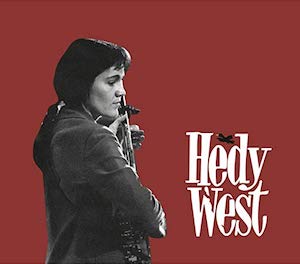 Hedy West – Untitled
Hedy West – Untitled
Fledg’ling – 19 April 2019
Hedy West never quite received the commercial or critical success of some of her contemporaries. That may be due in part to bad timing: she just missed out on the first wave of the folk revival, but her style never quite suited the second wave that revolved around the more urban and more urbane coffee house folk of Judy Collins, Bob Dylan, Joan Baez et al. Or it may have had more to do with perceptions of femininity in folk music. Women were often expected to play and sing in a style that validated preconceptions: ethereal, high-register singing, dainty fingerpicking. But West never wanted to be the fairytale princess of folk, nor was she content to be the vehicle for the songs of male songwriters. In this respect, she was a true original. Her singing was no less impressive than that of, say, Jean Ritchie, but it was an earthier, bluesier type of singing, often ripe with humour, always full of personality. And her banjo playing was similarly uncompromising and unconventional. It could be melodious or percussive, or both at once. She never denied the influence of jazz and black spiritual music and on songs like her fiery take on Little Sadie, there is a distinctive combination of folk, bluegrass and blues.
Like many American folk musicians of the time, West spent years travelling in Europe, first in the UK and then, in the 1970s, Germany, where she lived for much of the decade. The songs that make up Untitled were recorded in 1979. Quite why they remained unreleased until now is something of a mystery, as they contain some of her best and most interesting work. Bush Whacker is a paean to the itinerant lifestyle of the folk singer, embellished by sprightly banjo and Tracey Schwartz’s fiddle, which is echoed later in the album by the country-tinged Hobo’s Lullaby. The Plains Of Waterloo is delivered in an almost conversational style. Laconic and ironic in tone, and with a distinctly DIY feel, it predicts the style of the anti-folk movement that began two decades later. Even more pithy and colloquial is Born In North Carolina. West’s voice, always pliant, is stretched like elastic.
The traditions of German lieder and European folk music were a constant inspiration to West and came to the fore in Der Graben, a song composed by Hanns Eisler with words by the Weimar journalist and activist Kurt Tucholsky. Again, the combination of Anglo-American instrumentation and Mitteleuropean lyricism feels oddly prescient: echoes of it can be heard in Josephine Foster’s 2005 album of lieder, A Wolf In Sheep’s Clothing.
Two of West’s strongest suits, her humour and her political awareness, are combined to great effect in The Three Friends. The story, which tells of a bird, a mouse, and a sentient sausage, will be well-known to anyone who has read it (albeit in a sanitised form) in the Helen Cooper’s children’s book Pumpkin Soup. The original text was collected by the Brothers Grimm, and the way in which West imbues it with contemporary resonance is deft and funny. She is also adept at the strictly traditional – witness the unaccompanied Young Edmund and an ardent version of Queen Jane – and in interpretations of other songwriters (a performance Malvina Reynolds’ On The Rim Of The World, which feels like it could have been written especially with West in mind).
It may have taken the best part of forty years for this album to see the light of day, but it still feels like something of a landmark release, and credit must go to Fledg’ling for finally making it available. Hedy West died in 2005 and never got the recognition she deserved during her lifetime. Whether this release will go some way to rectifying that remains to be seen, but either way, it is a welcome addition to a consistently excellent body of work by one of the twentieth century’s very finest folk singers.
https://www.youtube.com/playlist?list=OLAK5uy_l8cCL_ekh29OrMZ3IkiDTVYlzFubZR5pY
Untitled is out now: Fledg’ling | Amazon
